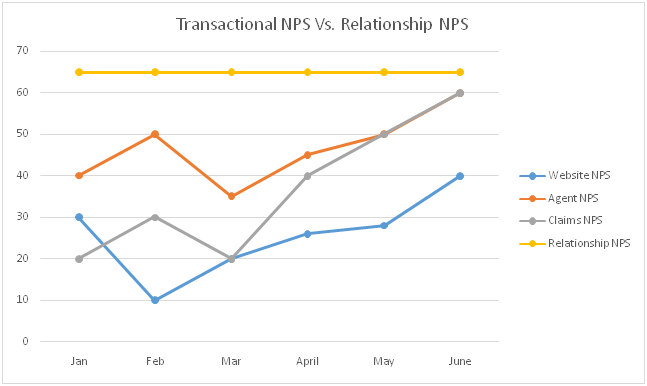While Net Promoter Score (NPS®) programs are conducted to understand how happy or unhappy your customers are with your services, one of the main objectives of implementing these programs is to convert detractors into promoters. To achieve this, an EPIC customer experience throughout their customer journey is imperative.
While initiating an NPS survey, every organization is under the dilemma whether to start with a transactional NPS survey or relationship NPS survey. Both are different from each other and their application depends upon the organization's goal and industry benchmark.
What are Transactional NPS surveys?
Transactional NPS surveys are generally conducted to understand a customer’s experience at a very specific interaction or touchpoints. Here, the goal of the survey is to know how satisfied the customers are with a specific process/ transaction/ touch point. It is not aimed to evaluate the overall customer loyalty to your company but it measures customer’s likelihood towards a particular process. Transactional NPS can act as a front line feedback tool that can diagnose a customer problem with regards to a transaction. This feedback can help an organization take corrective measures to rectify the problems with existing processes.
A typical transactional NPS survey directly refers to a transaction, such as:
Based on your recent billing experience, how likely are you to recommend us to a colleague or client on a scale of 0 to 10?
Transactional NPS surveys are carried out in both B2C and B2B organizations. Having said that, a B2C organization will have a larger number of transactional NPS as compared to that a B2B organization. Since the frequency of transactional NPS surveys are huge (they are generally conducted every weekly or twice a week), it is very important that you reach out to your customers at the right time.
So, what is the right time for transactional NPS surveys? Well, you need to reach out to your customers just after an interaction so that the customers don’t forget that transaction (or the experience associated with it).
Also, it is equally important to identify the important touch points for which you are aiming to conduct the transactional NPS surveys. Too many surveys might irritate the customers.
What are Relationship NPS Surveys?
Relationship surveys give you an overview about how your customer feels about their entire journey with your organization. These surveys generally help you understand the likelihood of your customer recommending you to their friends or colleagues. In a B2C set-up, relationship NPS surveys let you compare your organization with your competitors. It also depicts the overall health of the company in terms of customer retention and repeat purchase.
Relationship NPS surveys generally try to understand the overall customer experience of your customer. Therefore, the survey question is straight forward as:
How likely are you to recommend us to a colleague or client on a scale of 0 to 10?
Globally, an NPS leader is usually the market leader. For example, companies like USAA, Apple, Nike, Netflix and Amazon have superior NPS score as compared to their competition and they are market leaders in their respective fields as well.
Relationship NPS surveys are generally conducted quarterly, half-yearly or annually.
Which one should you use:
A relationship survey will help you identify loyal customers; a transactional survey will let you know the areas of improvement at each touch point. Relationship NPS can get influenced by the transactional NPS but transactional NPS is independent and has a score of its own. For example: A customer might give you a poor rating for your agent but might give you a good rating for your claim settlement and for overall relationship NPS.
 As stated earlier, both transactional and relationship surveys are complimentary to each other. The right survey type for your organization depends upon your organization’s goals. Transactional and relationship surveys are a great tool to measure customer loyalty but they will not tell you how to improve your NPS score or define the next course of action. PULSE is an actionable NPS tool that derives hidden insights from customer survey data and lets you know the areas of improvement.
As stated earlier, both transactional and relationship surveys are complimentary to each other. The right survey type for your organization depends upon your organization’s goals. Transactional and relationship surveys are a great tool to measure customer loyalty but they will not tell you how to improve your NPS score or define the next course of action. PULSE is an actionable NPS tool that derives hidden insights from customer survey data and lets you know the areas of improvement.



